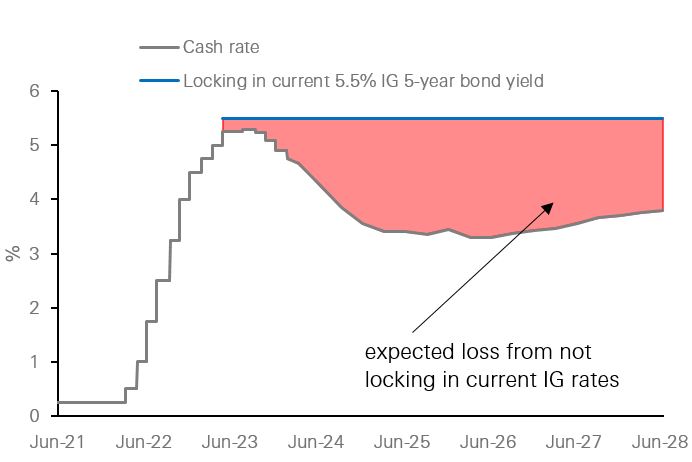
26 Jun 2023
Ashis Dash
Director and Head of Fixed Income Funds, HSBC Wealth and Personal Banking
Following successive rate hikes by major central banks during 2022 and H1 2023, deposit rates in many developed markets (DM) have become more attractive. The hawkish moves by key DM central banks have also pushed bond yields higher.
While short-term investments, such as time deposits and short-term funds do have their benefits within a portfolio, global investment grade (IG) corporate bonds may be preferred due to the following reasons:
Based on data from 2000 onwards, bonds have generally outperformed cash once policy rates have peaked because of the higher rate sensitivity of the asset class. Although tempting, higher yields on cash and short-term bonds come with an opportunity cost of missed returns during periods of looser monetary policy, and/or recessions, as yields often decline when central banks ease monetary policy.
Accessing global IG bonds through mutual funds allows investors to participate in a diverse portfolio, holding a range of securities from many different issuers and maturities. This reduces the effects of specific risks linked to individual issuers/bonds and can help in better preserving capital, generating returns and ensuring liquidity compared to holding a single security. Nevertheless, investors should also be mindful of the risk of losing their capital when investing in mutual funds and the costs incurred for investing in these funds.





We’re not trying to sell you any products or services, we’re just sharing information. This information isn’t tailored for you. It’s important you consider a range of factors when making investment decisions, and if you need help, speak to a financial adviser.
As with all investments, historical data shouldn’t be taken as an indication of future performance. We can’t be held responsible for any financial decisions you make because of this information. Investing comes with risks, and there’s a chance you might not get back as much as you put in.
This document provides you with information about markets or economic events. We use publicly available information, which we believe is reliable but we haven’t verified the information so we can’t guarantee its accuracy.
This document belongs to HSBC. You shouldn’t copy, store or share any information in it unless you have written permission from us.
We’ll never share this document in a country where it’s illegal. This document is prepared by, or on behalf of, HSBC UK Bank Plc, which is owned by HSBC Holdings plc. HSBC’s corporate address is 1 Centenary Square, Birmingham BI IHQ United Kingdom. HSBC UK is governed by the laws of England and Wales. We’re authorised by the Prudential Regulation Authority (PRA) and regulated by the Financial Conduct Authority (FCA) and the PRA. Our firm reference number is 765112 and our company registration number is 9928412.
1. Duration of the Bloomberg Global Aggregate Corporate Index (hedged to USD) is c. 6 years.
2. Duration measures the sensitivity of a bond’s price to changes in interest rates. For a bond (or a fund) with duration of 1 year, a fall in interest rates by 1% would mean that the bond’s price will increase by approximately 1%, assuming no changes to credit spreads. Similarly, for a bond with 6 years of duration, its price will increase by approximately 6% when interest rates fall by 1%, plus the 5% yield, getting to a total return of 11%.
3. Data for Bloomberg Global Aggregate Corporate Index (hedged to USD) is available from Sep 2000. For periods prior to that Bloomberg US Corporate Bond Index has been used.